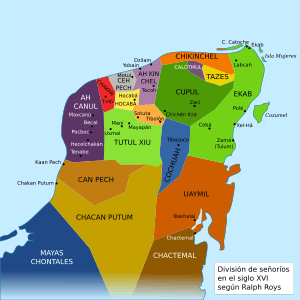Kuchkabal
The Kuchkabal, Ah Kuch-Kab, or Ah Cuch-Cab (plural Kuchkabalob) were the forms of government used by the pre-Columbian nations of the Yucatan Peninsula.[1] There were somewhere between 16 and 24 kuchkabalob in the 16th century.[2] Kuchkabal could also refer to the ruling family.

Organization
The Kuchkabals were divided into municipalities called batalib (plural batalibob), and each Batalib was ruled by a batab (batabob plural). The ruler of a Kuchkabal was called a Halach Uinik, which means "real man". A Halach Uinik was a monarch, but some kuchkabals were oligarchies, with batabil having a seat on a senate. As in the case of Ekab one batalib usually had more powerful batabob. The batabob were normally related to the Halach Uinik.
Rebellion and war against the Cocom
Since 987, when the Toltecs went into decline, the League of Mayapan had been the main power in Yucatan. In 1441 the league had a civil war between the Cocom and Tutul Xiues. The rest of the league took advantage of the war and rebelled. By 1461 the League of Mayapan had been completely disintegrated into seventeen Kuchkabals. Other nations declared independence during this time and before. They were Tabasco, Acalan, Yalain, Kowoj, the Itza Kingdom, Mopan, Kejache, Cocom, and Ch'orti'.
The Kuchkabals
At the time of the breakup of the League of Mayapan in 1441 there were seventeen Kuchabals: Ekab, Chakan Putum, Ah Canul, Ceh Pech, Tutul-Xiu, Sotuta, Hocaba, Chakan, Ah Kin Chel, Cupul, Tazes, Chikinchel, Uaymil, Chactemal, Cochuah, Can Pech, and Calotmul. Calotmul was conquered by the Tutul-Xiues. A year after the Spanish conquest in 1547, the Mayas rebelled and formed a kuchkabal in the north east of Yucatan. Its capital was Zaci in Cupul.
Notes
- Andrews 1984, p. 589.
- Andrews 1984, p. 589.
References
- Andrews, Anthony P. (Winter 1984). "The Political Geography of the Sixteenth Century Yucatan Maya: Comments and Revisions". Journal of Anthropological Research. Albuquerque, New Mexico, US: University of New Mexico. 40 (4): 589–596. JSTOR 3629799. (subscription required)